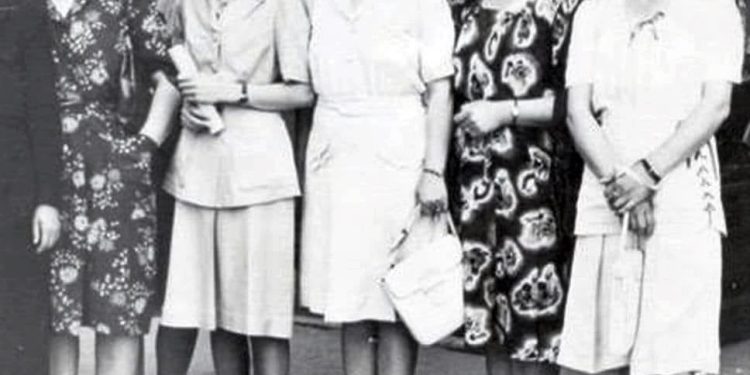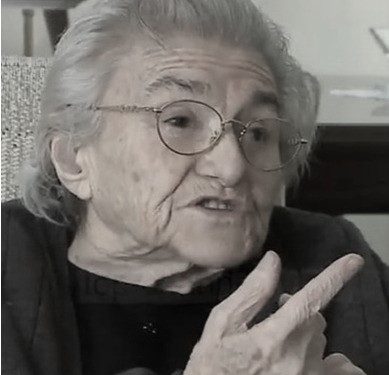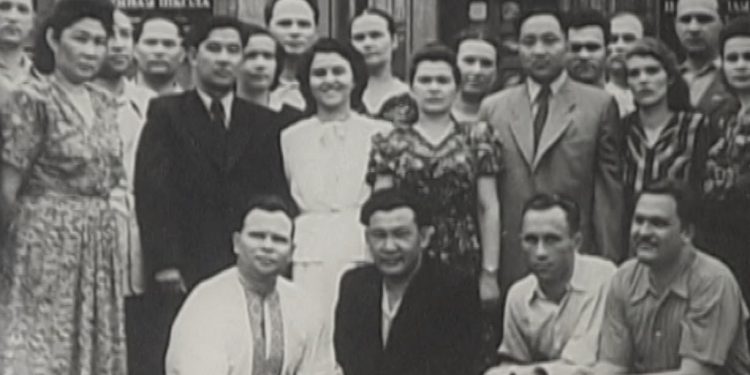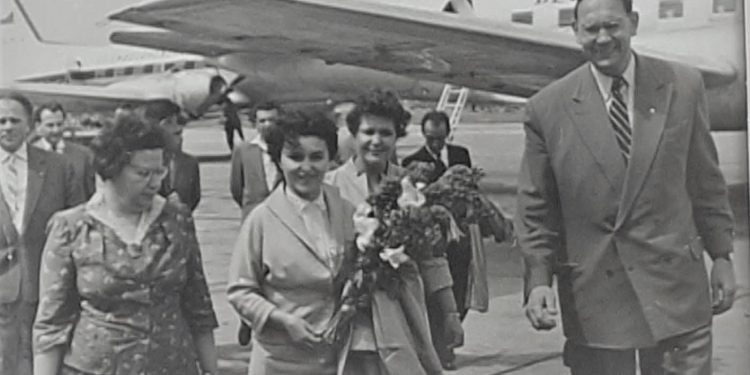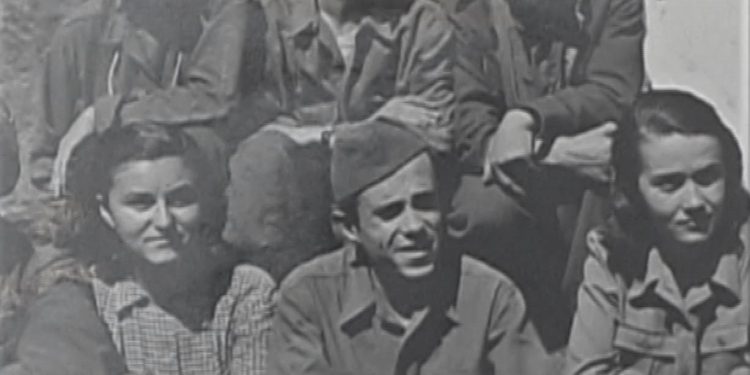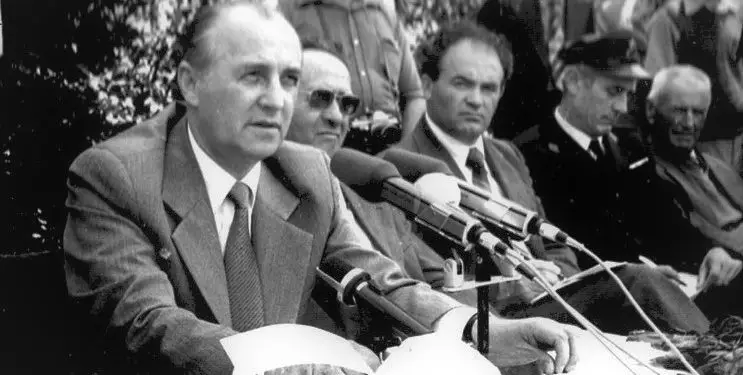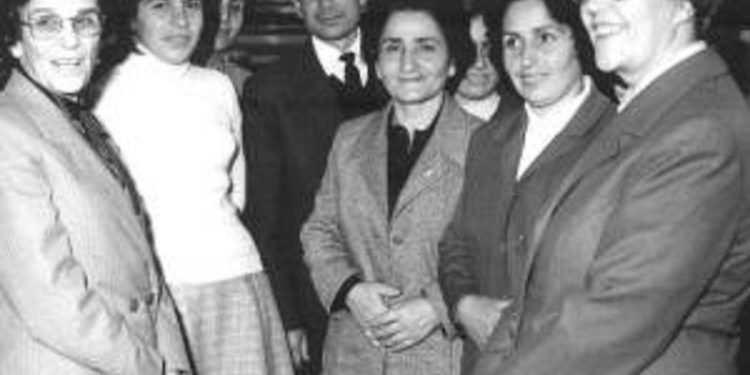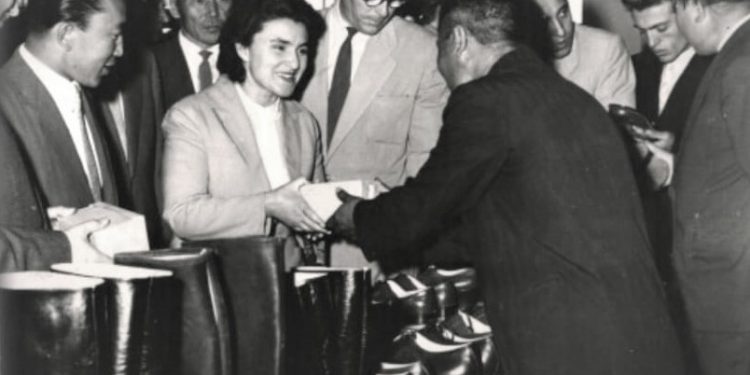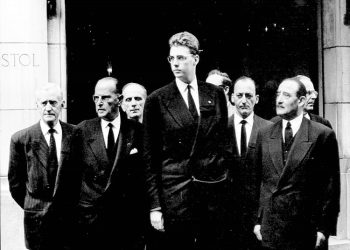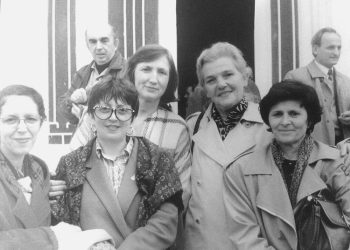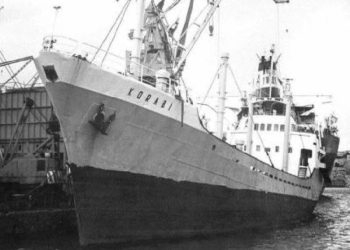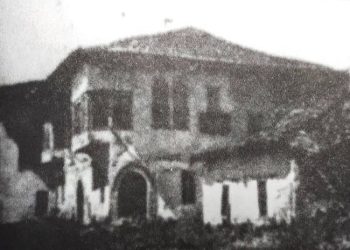By Elisabeta Ilnica
The fourth part
Memorie.al / She were only 16 years old, when she was accepted as a member of the Regional Committee of the Communist Youth of Tirana, that is, also of the Anti-Fascist Youth. While a year later, he was entrusted with the direction of all the youth of the capital. At the age of 18, she was elected a member of the Central Committee of the Communist Youth of Albania and soon after, she found herself in the Central Committee of the Communist Party. This was Liri Belishova, who lost her eye as a teenager in the War, while after the war, she lost the titles she received, and she lost her daughter Drita, but also two husbands, Nako Spiron and Maqo Çomon. She lost 31 years of her life in exile and many of her friends. Also educated in the former Soviet Union, one of the main exponents of the Anti-Fascist National Liberation War, a member of the Political Bureau and the Central Committee of the ALP, she was expelled in 1960 as an “enemy of the Party”, initially interned in Gjirokastër and then in Cërrik and Mallakastër, until 1991.
Continues from last issue
Ms. Belishova, from 1992 when democracy officially came until now, 23 years have passed. In these two decades, Nexhmije Hoxha lived and lives in Laprakë. Have you ever thought of going to his house and confronting him about all the allegations?
I could do that, but not with a man like Nexhmija. But with a man who does not have these crimes, it is not so penalized. I would remember the girl…! How can I be a widow? What would I do going home to her? To insult him? Spit it out? There is nothing left; there is nothing left in my heart for Nexhmije Hoxha, for the behavior he has done. They say 20 years…!
Was it not possible to avoid your exile from other family disasters, at the hands of your friends in the Party?
I have a bitter experience. When I returned from exile in Tirana, no one came to meet me and confess to me: “Ever since Enver Hoxha used to say that, this friend and I thought differently. But we had nothing to do.” And I believe this, they had nothing to do. They didn’t have…! That there was an extraordinary espionage network. It was not for nothing that Kadri Hazbiu said: “We know how many spoons and forks every Tirana has at home.”
And Ramiz Alia, how did he manage to become Enver Hoxha’s successor? Was it a last-ditch decision, or a premeditated plan?
Enver Hoxha did it with a plan that is, starting to age, but without getting sick. He took him and made him director of Propaganda, to bring him close to the Central Committee of the ALP, close to himself. And he met her. Enver should meet me, but…! Maybe he thought, and for that he was right, that Mehmet Shehu was better than him (laughs).
To be honest, from Mehmet Shehu, I did not understand anything that was against Enver. Just one thing, at the beginning of our life in the Bureau, when Enveri made those conclusions “it goes on and on and on and on and on” that didn’t end for hours, Mehmet got nervous, because he was an impulsive person, because he couldn’t keep that nervousness. I was also nervous, but I didn’t show it…! He used to meet Ramiz Ali more.
So he thought of the plan early?
Yes, yes, he thought of it early. He did this because he thought that he would be as well-formed as possible, but also as well-controlled as possible. He would trust the dynasty. He would trust not only Albania, but also his family.
In the entire apparatus of the Central Committee of the ALP, the Political Bureau, etc., there was no one more talented than Ramiz Alia?
Enver Hoxha also trusted Hysni Kapo, but Hysniu was not very good. Mehmet Shehu was very good, but Enver Hoxha did not trust Mehmet Shehu.
Why didn’t he believe Mehmet Shehu?
Maybe he thought, and for that he was right, that Mehmet Shehu was better than him (laughs). To be honest, I have not understood anything from Mehmet Shehu that was against Enver. Just one thing, at the beginning of our life in the Bureau, when Enveri made those conclusions “it goes on and on and on and on and on” that didn’t end for hours, Mehmet got nervous, because he was an impulsive person, because he couldn’t keep that nervousness. I was nervous too, but I didn’t show it…
So deep and competent was Enveri in information?
Enver had a terrible inflation of words and was extremely superficial, there was no problem in the Bureau that he was really competent. Although it required material, we prepared a large file for each problem. He wasn’t stupid, to tell the truth. He read, he read, but it’s not just a culture of reading. Read one thing today and another thing tomorrow, there was cursory and ecliptic knowledge and not systematic, in-depth, with analysis…!
I, when I compare it with Nako Spiro, I see a big difference. Nako, when he started reading something, verified everything. I remember once when Nako was reading something about Stalin. We were in a room, his study attached, with a door in the middle. He would get up from there, “snort” in the library, rummage there and get something, then come and read again. He did this for every book that had references, he verified them all.
Beyond what has been said about your imprisonment, what was the “real fault” of Liri Belishova, that she could not swallow Enver Hoxha or anyone else, so that she imprisoned you?
In the international communist movement, controversy broke out between those who criticized Stalin, condemned Stalinism and were for a more moderate political course, with elements of democratization, and especially for a policy of peaceful coexistence with the West, focusing on avoiding a World War the Third World, which would definitely be atomic, because in the meantime atomic weapons were present. At first, Enver Hoxha wavered, because he could not bear to oppose the Soviet Union. But maybe…!
Beyond what has been said about your exile and the imprisonment of your husband Maqo Çomo, what was the “real fault” of Liri Belishova, that she could not swallow Enver Hoxha or anyone else, so that family persecution started against you?
“Guilt” is what I will explain…! But maybe every human mind, I’m assuming Enver Hoxha too, why wouldn’t he like a peaceful course? This is unbelievable, that his mind was very wicked (laughs)… Enver Hoxha was scared by the Tirana Conference. In this Conference, half-heartedly, with the language of Aesop, many criticisms were raised against him.
Then he realized that he would be held accountable for what he had done in Albania. And being a man who put his dictatorial chair for everything, Enver, with all his strength, opposed Stalin’s criticism, this famous Marxist-Leninist grabbed the banner of Stalinism.
This tactic of his has made many journalists and world personalities laugh, because they knew that if there was a Communist Party, very poor from the point of view of theoretical preparation and cadres as philosophers, Marxist theoreticians, this was the Albanian Communist Party in Europe. So, Enver Hoxha took the Stalinist course, because only with such a course, he could better ensure his dictatorial rule. While a liberalization-democratization course created difficulties and risks for him.
What about you, were you for this new course?
Yes, I have been for the new course. I think that the other members were also in the spirit, but they did not dare to go against Enver.
Did the support of this course “burn” you?
How was my punishment…! The Chinese, on the occasion of the 100th anniversary of Lenin’s birth, which falls in April 1960, published a series of articles in their central organ, with the common title: Long live Leninism! These articles came to us late, until they were translated, etc. Reading these articles, I realized that the Chinese not only do not agree with the new course, but intend to oppose it openly. That neither the Soviet Union nor Khrushchev was mentioned there, but it said “Yugoslav revisionism”, or simply “modern revisionism”.
A man, who lived with these things, understood that he was knocking on the pot, for the door to be heard. Thanas Nano, who at that time was the director of the Albanian Telegraphic Agency, also understood this. From ATSH, we were sent typed news that was received there, but divided in this way: The Blue Bulletin, which also went to newspapers and radio, so it was news that could be published or appeared on TVSH radio. The green bulletin was sent to members of the Politburo, ministers and a selected constituency; these were not intended for publication.
Meanwhile, sometimes there were also some special envelopes, which were sent to Enver Hoxha, but often to me as the secretary of Propaganda, Mehmet Shehu. These were news that even the members of the ALP Central Committee did not know. These especially when this “war” for Stalinism and against Stalinism started. These Chinese articles came in the green envelope, so they should not have been published. A couple of days passed and Enver Hoxha called me in his office.
He said to me: “Liri, have you read the articles in the Chinese newspaper”? I said: “Yes”. He told me: “Why weren’t they published in the newspaper, in the ‘Voice of the People'”?! I answered: “They have not been published, Comrade Enver, because they contradict what you said at the Third Party Congress, how we could publish them?” With the Resolution of the meetings of the Communist Parties in Moscow”? I told her like this, that I knew that Enver was interested in her, his prestige…! He said “good”, and so I left the office. The next day he calls me to the office again.
He tells me: “I talked to my friends and they told me to publish the Chinese articles.” When he said “friends” he meant Mehmet Shehu and Hysni Kapo. Sometimes they also called Beqiri, but the desolate Beqiri was not at the level of these. I started again in a broader way, showing him what Marx, Engels, Lenin, etc. wrote. I told him: “Comrade Enver, these articles contradict what Lenin said.”
Then I started to argue with him at length. Again he said “good” and I left. The third or fourth time, because I don’t remember how many times he called me for the same thing, to tell the truth, I saw from his face that there was no longer any discussion. He told me: “We have decided with our friends to publish a summary, an abridgement of the articles. Take one of your friends and shorten them and publish them in the ‘Voice of the People'”. “Yes, they are not shortened, friend Enver”, I told him. “No, no, they will be shortened and published, that’s what we decided.”
I left and this is where the relations of the members of the Political Bureau with Enver Hoxha are understood. I was the secretary of the Central Committee, a member of the Political Bureau, moreover, I had also graduated from a university in the Soviet Union, etc. and still I had nothing to do. So are the others. I took Ramiz Ali, who was the director of Propaganda, and we sat down. It was very difficult to shorten them, because the articles had a structure that, if you removed something, the whole article fell, the meaning fell.
Or take out a paragraph, but the same idea was in the following paragraphs. I said to Ramiz: “O Ramiz, I want to tell Enver myself that these are not shortened.” Ramizi told me: “Sit there and let’s cut they short.” Did Enveri tell you that they have decided to publish them, they have the responsibility”. I was still insisting that I go, while Ramizi still wouldn’t let me and told me: “Sit down”. And this shows the nature of Ramiz Ali.
Which nature of Ramiz Ali?
On the one hand, he understood things. It wasn’t even wild, mean. If it was someone else, he would say: “Let the widow tell Enver and eat his head, I will take his place.” While Ramizi constantly told me: “Sit down, sit down and don’t go”. On the other hand, it was what I said to him: “Well, why did we do school. We have to tell our friends that these articles are not right.” But this thing for Ramiz Ali didn’t matter, okay or not okay. It was important that, for him, it was okay not to be endangered.
But he didn’t want me to be in danger either. So Ramiz felt sorry for me too. On the one hand he was right; my intervention was pointless because Enver would do what he had in mind. But I still tried, because I succeeded the first two times, I remembered that Enver will listen to me. I went back and then Enveri said to me, knocking on the table: “Okay Liri, we will not publish the articles”.
But even now I consider his gaze. That’s where my fate was decided. Enveri thought: “Not only does she not agree with the position I will take, but she is determined to defend her position. I don’t need obstacles, discussions about that are right and who is not, I want that when I say that something will be done, there is a standing ovation”. As Enveri thought, it was done, everyone stood up, applauding everything Enveri said and approving: Long live the Party, long live Comrade Enver!…
Were the Chinese articles published?
No, I left Enver’s office and the articles were not published in the newspaper. Then, I went with the parliamentary delegation to China, headed by Haxhi Lleshi. During this time, Enver got along with the Chinese Embassy and these articles were published in a book with a red cover and a small portrait of Mao in the middle. They were distributed in the party, in the youth, in the universities and the first ideological manipulation took place.
As I was in China, the day we were going to leave Beijing and go to Shanghai, the Chinese asked us to meet as a party in the evening. I, knowing what the Chinese would propose, avoided the meeting because I was instructed by Enver: “If the Chinese tell you about the disagreements and criticisms with the Soviets tell them that these are resolved by the two big ones”, that is, the leaders. I told that Chinese official whose name I do not remember now: “I am not authorized to hold party talks.”
Why didn’t you tell them, as Enver instructed you: “Let the two big ones decide”?
I couldn’t say it literally because I wasn’t 100 percent sure what the Chinese were going to discuss. That Chinese may have come 6 times, asking us to meet. Finally, he told me to go for some tea. We mourned. What did we see? The meeting tables were ready, with paper and pen. It was almost the entire Politburo of China.
Who were you with?
The whole delegation, headed by the president Haxhi Lleshi, was me, Lefter Goga from Durrës, etc.
What happened next?
The Chinese, from 8 o’clock in the evening that we had until 4 o’clock in the morning, criticized the opportunism of Khrushchev and the Soviet Union. The meeting was opened by Liu Xiaoqiu, while Mao Zedong had been sent to a province and as he told us from our embassy, Liu had already taken power. Liu spoke, criticizing the Soviet Union, up to the novels, the films that are not filling the youth with a military spirit, but with a peaceful spirit, with attraction, with the extinguishing of the revolutionary spirit.
The conclusion was that: “we are not going to the meeting in Bucharest” (which was scheduled on the occasion of the Congress of the Romanian Communist Party, since many delegations of the communist parties would go, a meeting of the representatives of the communist parties of the socialist camp would take place).
“We don’t go to Bucharest, because there they will accuse us and criticize us…”, according to the Chinese. I was worried, because I thought: “If the Chinese don’t come to Bucharest, history will repeat itself like with Yugoslavia. They will start insulting China and division is inevitable”. I was worried about this. I said: “What you told us, we will report everything to Comrade Enver.
But I am also showing my personal opinion: The good thing is that things are resolved through discussion, as Enveri told me, between the two big parties. The good thing is to go to the meeting in Bucharest, because the talks always help to clarify things”.
Liu said: “We are not going to Bucharest, but we want Comrade Enver’s opinion about this and what he thinks about our articles.”
So the subtext was whether or not Enver agreed with the Chinese line. I told him: “We have a lot of difficulties in communication, because we do not have a direct connection with Tirana. Our Embassy in Beijing should be connected to Tirana through the Albanian Embassy in Moscow”.
We returned home and I briefly radiographed Enver about what had happened, while I sent the detailed report to him with Jorgji Peqini that she would leave the next day. So we would run away to Shanghai and she to Albania, because she was with a youth delegation. Without running away from Beijing, since the meeting in Bucharest was going to take place soon and the Chinese said: “we will not go”, until our radiogram was sent to Tirana and the answer came back, naturally it would be delayed, then we talked to Gogo Nushi, who was there with the delegation of Trade Unions and Professional Unions and with two members of the bureau.
I told Gogo Nushi: “More Gogo, if they don’t come to the meeting, it will be like Yugoslavia.” Deserted Gogo was very honest, he was revolted with the Chinese and said: “These are thugs and they want the Third World War. Let’s wait for the Soviet ambassador and tell him that the Chinese do not want to come to the meeting in Bucharest, thinking that they will be criticized. Then either convince them to come, or postpone the meeting so you have more time to get along with them. That China is not just Yugoslavia, but is a continent that has a great influence in the ‘third world’, as it was called then”.
So we did. We called the Soviet Embassy. The ambassador did not come, but his adviser. We were told about the ambassador that he is sick. Half an hour, briefly, I told about the meeting with the Political Bureau of China, while Gogo, about the meeting with the Trade Unions, that there was also talk against the Soviet Union. Our proposal was the one I mentioned above: “Either run the Chinese, or postpone the meeting.” I wrote all this to Enver, so nothing secret, no conspiracy. We fled from Beijing to Shanghai.
We spent two days in Shanghai and when we were about to leave, even as we were about to leave, Gogo Nushi arrived and gave me the radiogram of Enver, who had come to our embassy and said: “Tell the Chinese to come to Bucharest. Tell the Chinese that we agree with your articles.” “Waaaaaa,” I said, “Gogo, see what Enveri says”! “What”? Said Gogo, while after seeing it, he suggested to me: “You know what? Don’t say anything to the Chinese, I also tell Enver that when I went to Shanghai, Liria was gone”. But I did not eat that olive grain. That in the first criticism that Enver would make to Gogo, Gogua, making honest self-criticism, would show.
Fleeing to the airport by car, on the way I said to Gogo: “I found Gogo what to do.” “What”? Gogo said. “Tell the Chinese that Comrade Enver is thinking of coming to Bucharest, that this is the main thing. For the articles, let’s ask the embassy that they didn’t get it wrong,” I told Gogo. Gogo told me: “Very good”. Then I said to the secretary of Shanghai, who was a member of the Political Bureau: “Comrade Enver thinks you should go to Bucharest.”
He was a tall guy, he hugged me and a pretty man burst into tears saying: “Very good, friend Belishova, very good. We are brothers, like 10 fingers of which 9 unite us and 1 separates us”. We left Shanghai and after 4 hours we arrived in Kumnin, in the South of China, near Vietnam. There the Chinese separated me from the delegation and took me separately in a car. We followed a short way and went to a guest house. There they told me that our Albanian Embassy in Beijing was looking for me on the phone since morning.
We got the Embassy on the phone and the secretary or adviser (I don’t remember well), asked me: “Did you tell the Chinese the telegram that friend Gogo gave you”?! “Yes”, I answered. He vented from the other side of the phone: “Oboooooo”. “What do you have”? I asked him. “Another telegram has arrived and says to tell the Chinese the first point, don’t tell them the second point”.
That is, the first point was that “go to Bucharest” and should have been said, the second point “that we agree with your line as in the articles” should not have been said. I reassured the one from the embassy: “Don’t be afraid, because I didn’t say the second point.” I would have asked you before, because you didn’t explain it well, so don’t worry.” Now, after all this, the attack on me began. The first criticism, why did you tell the Soviets that the Chinese will not come to Bucharest?
Second, where did you find the right not to follow Comrade Enver’s order, could the second radiogram not have arrived? Idiots that don’t even resist the logic of a first-grade child… Instead of telling me “good thing you didn’t broadcast it”, they attacked me for violating Comrade Enver’s order and the Party’s discipline.
What did Enver say to you face to face, when you returned from China?
I met him, but Enver did not raise this issue of the telegram to me personally, he did not say anything bad to me when I met him face to face, he even got up from the table and hugged me. He smiled and jokingly said to me: “Obobo, how much you have changed”. I, taking it as a subtext, told him: “I don’t change so easily, friend Enver.” He laughed again. A few months later, he brought the case to the Bureau.
Do you think that Enver was really okay with these developments in China, or did he simply “skip” them for the moment to reopen them later, or did someone else push him on this issue?
Enver was a changeling type. But I believe that Mehmet Shehu may also have influenced in this matter. That Mehmeti was more aggressive and determined, Enveri was more vacillating.
As long as Haxhi Lleshi was the president of the delegation, while Gogo Nushi was also aware of the event, why should the responsibility fall only on you?
You are right. I was criticized and punished in the Political Bureau. The meeting of the Central Committee was held, only I was criticized. Over 100 or so questions that the members of the Central Committee asked me. Yes, the questions were discussions, where does this opportunist-revisionist line of Liri Belishova lead, what was its purpose, where did it aim?
What did they mean by that?
I was the secretary of the Central Committee and they meant that I wanted to become Enver Hoxha. So, to answer your initial question, “my fault” was Enver Hoxha’s illusion, his paranoia, as if I wanted him to take his place. And they didn’t say this openly, but by implication through discussions, constantly asking me where my goal was. And they would only be satisfied if I told them that I intended to overthrow Enver Hoxha and become the General Secretary, which I had never even thought of.
What about Haxhi Lleshi, what did they say?
During the plenum, Shefqet Peçi stood up and said: Okay, this Liberty was wrong. Then he looked at me and added “with a pin” so that I and others would understand: Even Liria must remember that she made a mistake, and she will continue to make mistakes, because she is very smart (laughs). Friends, Liria is very smart, remember that she will make a mistake again. What about there in China, except for Freedom? What about Haxhiu and Gogua, who are older than Liria, both in terms of age and in the party, they are not to blame”?
Did anyone react after his intervention?
Enver Hoxha walked through the U-shaped tables and immediately said to Shefqet: “Very good Shefqet, very good, sit down.” And he lowered it directly so that Shefqeti would not continue. Enveri then shook the conversation and said: “I think that Comrade Haxhi and Comrade Shefqet are old fellow fighters, but they have a big flaw, they have not given importance to cultural and ideological development.”
So he just didn’t bluntly say that “these are donkeys”. Then he continued: “Freedom takes things by the nose. I propose that we give two friends, Haxhiu and Gogo, a remark with a note in their biography. Agree, friends?”. Everyone in chorus answered: “Dakoooord”. That was the end of their work. That if their work had continued, it would have turned out that Haxhi Lleshi was against the Chinese in the first meeting. Gogo Nushi cursed the Chinese and said that they were criminals, so everything would happen to them.
How did you feel when you received criticism from your friends?
Here’s something to tell you: When my friends attacked me like that in the Bureau, I remembered the words of Nako Spiro, before his death: They attacked me like wolves”. That’s what I thought. I was a young woman, only 32 years old…!
What action did the Bureau take against you?
They decided to expel me from the Bureau. The Central Committee decided to expel me from the Central Committee, while the basic organization also expelled me from the Party. So was the avalanche. Then I was sent to work as a principal at the 7-year-old school “Hasan Vogli” in Tirana. Then they expelled my husband from the Central Committee and removed him as Minister of Agriculture, allegedly not for political reasons, but for “incompetence”!
Our family was removed from Tirana on November 9, 1960; they sent us to the “Muzo Asqeriu” farm near Gjirokastra. Me as the head teacher and him as the director of the Agricultural Farm. There we were expelled from the Party, after two months or so we were exiled to Kuç in Vlora. From Kuçi they took us to Progonat, they took him and took him to Zvrnec, and I lived there for 10 years. After 10 years, they moved me to Cërrik, where I stayed for 21 years. So 31 years in exile, I don’t know what to tell you before…! Memorie.al




